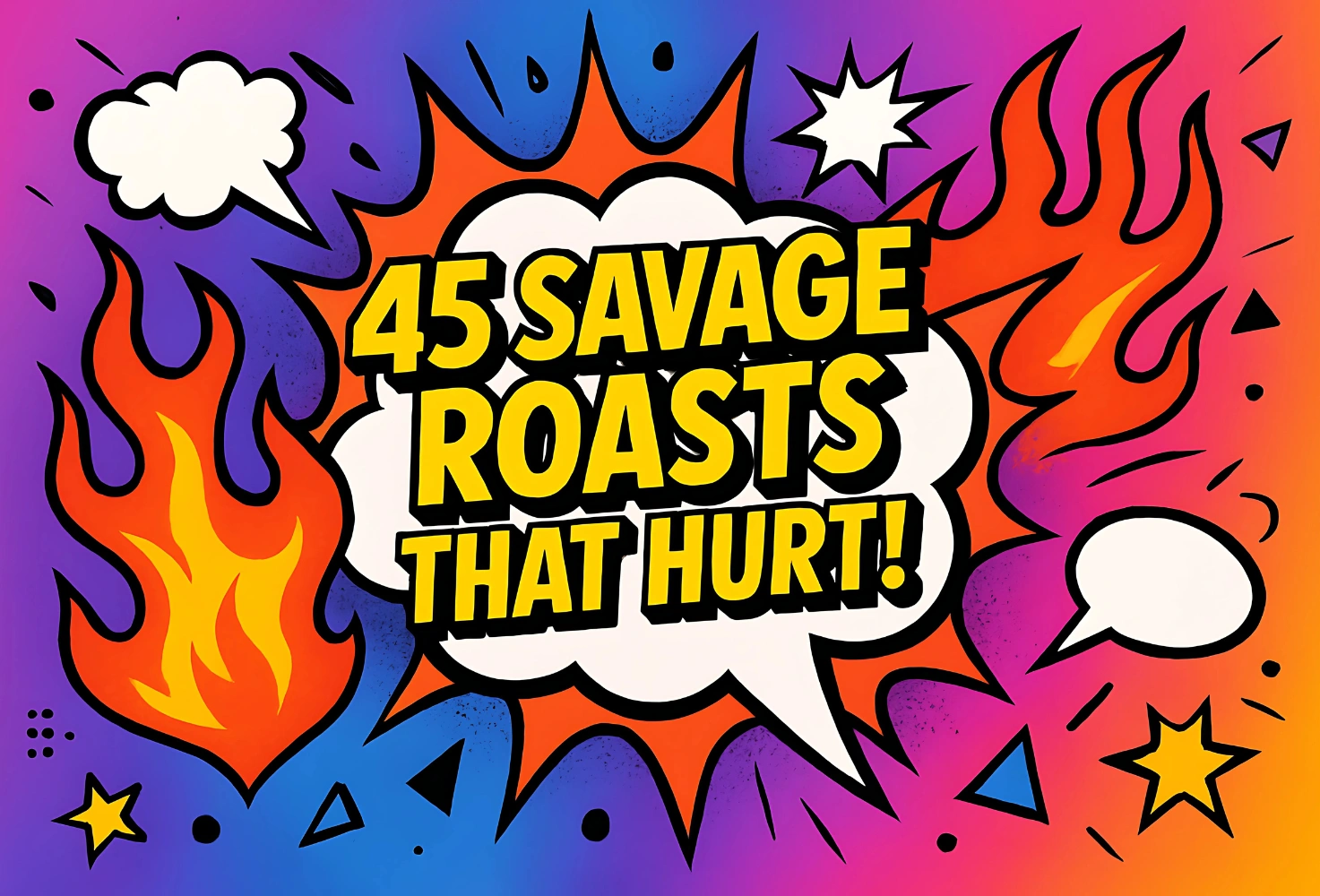Good roasts that pack a punch have entertained audiences ever since the Dean Martin Celebrity Roast first aired in 1974. The iconic show ran for 10 years and remains one of the most popular television programs of all time. Comedy Central picked up the torch 29 years later with their own roast series, which drew over 6.4 million viewers for its most-watched episode.
Roasting has become a competitive sport on social media, at family dinners, and even during Zoom meetings as we look ahead to 2025. People have always traded savage roasts and witty comebacks, but becoming skilled at delivering roasts that sting while staying within bounds takes real talent. This detailed guide showcases the best roast lines that strike the perfect balance between humor and respect. Readers will discover a collection of clean yet powerful comebacks they can use anywhere. The guide covers everything from rhyming roasts to office-friendly burns, giving readers the perfect response ready for any moment.
What Makes a Good Roast Funny and Clean
The perfect roast works like a high-wire performance. The best comics make it look easy, but every successful zinger needs solid technique and careful planning. The line between getting laughs and awkward silence comes down to three key things: timing, cleverness, and knowing your crowd.
Timing and delivery matter
Even the best roast lines fall flat without good timing. Comedic timing ranks among the hardest acting skills to teach – you just need to feel it to get those big laughs. The “pregnant pause” stands out as one of the most well-known timing techniques. Performers place it right before the punchline to build that sweet anticipation.
Nailing the timing means:
- Talking at a natural pace
- Adding pauses so people can follow along
- Not talking over laughs – a rookie mistake many nervous comics make
- Running through your delivery until it flows naturally
One comedy pro puts it this way: “The joke itself isn’t always what’s funny – it’s how you tell it”. So becoming skilled at timing can turn simple roast lines into unforgettable burns. The best roasts feel off-the-cuff, even though every word was planned out.
Keep it clever, not cruel
Great roast lines should entertain without actually hurting feelings. A savage roast shows off wordplay and sharp observation, not meanness. The sort of roasts that sting should make everyone laugh, not leave people feeling wounded.
Here’s how to keep roasts smart instead of mean:
Target behavior, not identity – The punchline should never be about someone’s identity. That’s nowhere near funny – it just gets groans instead of laughs.
Skip sensitive stuff – Politics, religion, and personal tragedies are off the table, especially in mixed groups. Stay away from things people can’t change about themselves.
Find the sweet spot – The best roasts mix humor with genuine respect. Even while teasing someone, show them you value them.
Know your audience
Reading your audience is a vital part of landing roasts that sting without crossing lines. One expert says it well: “Your target audience’s interests are the foundations of great content”.
Before dropping those carefully crafted burns, think over:
Who’s getting roasted? – Pick people who laugh at themselves. Someone who can’t take a joke shouldn’t be your target.
What’s your connection? – Your relationship decides what topics work. To cite an instance, siblings can get away with jokes that acquaintances can’t.
Who else will hear it? – Think about both your main target and everyone else in earshot. Something hilarious in private might not work in public.
The humor should match what your audience enjoys and relates to. A good roast connects with everyone there without making anyone feel left out.
Master these three elements and you’ll deliver roasts that sting just right – the mark of exceptional burns that hurt so good.
Best Roast Lines for Friends and Family
People bond best when they can laugh at each other’s expense—as long as it comes from a place of affection. A perfect roast between friends or family hits that sweet spot where someone feels slightly offended yet finds it genuinely funny. Let’s look at some killer roast lines you can use with your closest people.
Roasts for close friends
Real friendship lets you deliver brutal roasts while showing love. These lines work best with people who understand your good intentions:
- “I was going to give you a nasty look, but I see you already have one.”
- “You’re the reason tubes of toothpaste have instructions on them.”
- “I bet your pH level is 14. Basic.”
- “You’re as deep as a puddle in a parking lot.”
- “You really should come with a warning label.”
- “I would describe your personality as a vibrant shade of beige.”
- “It’s impossible to underestimate you.”
- “Did the middle of my sentence interrupt the beginning of yours?”
The best friend roasts target quirks they already know about. To cite an instance, the “Did my sentence interrupt the beginning of yours?” line lands perfectly with friends who know they tend to interrupt conversations because it stems from a truth they recognize.
Sibling burns that hit different
Siblings share a unique bond where roasts cut deeper yet somehow mean more. Their shared history creates room for customized zingers:
- “Little brothers prove that sequels are never as good as the original version of something.”
- “I often looked up to you as my big brother. Now that I’m fully grown, I can finally look down on you.”
- “It’s easy being the favorite child in this family when you’re my competition.”
- “The only thing big about my big brother is his ego!”
- “Someone must have been thinking of you, little sister, when they said, ‘a little bit goes a long way.'”
- “Don’t worry about filling my shoes, sis. No one expects you to turn into this!”
Sibling rivalry sets up the perfect stage for roasts about your shared childhood. The best sibling burns always hint at that unbreakable connection beneath all the teasing.
Family-friendly comebacks
Family gatherings need cleaner roasts that won’t shock grandma into dropping her dentures. These family-appropriate comebacks pack a punch without crossing any lines:
- “You have something on your chin… the third one down.”
- “You’re like a cloud—nice from far, annoying up close.”
- “Your sense of humor is like your Wi-Fi—weak.”
- “You’re like a printer—always jammed and never helpful.”
- “Right now, you’re about as useful as a soup sandwich.”
- “If you ever had a thought, it would die of loneliness.”
- “You’d struggle to pour water out of a boot with instructions on the heel.”
- “You have the charisma of a wet sock.”
Family-friendly roasts use harmless comparisons instead of personal attacks. They create vivid images that amuse without truly offending anyone.
Your relationship with someone determines how they’ll take these roast lines. The best roasts come from genuine affection—where you can tease ruthlessly one minute and stand up for each other the next. Good roasts aim to create those special moments of shared laughter that actually bring people closer together.
45 Good Roasts That Hurt (But Are Still Clean)
“Good roasts” are like verbal precision strikes that showcase the art of clever comebacks. These witty lines can cut deep while staying clean. Here are 45 roasts that will hurt feelings without crossing ethical lines or getting vulgar.
1. You bring everyone joy… when you leave the room
This classic roast works through clever misdirection – it starts with a nice compliment before hitting you with an unexpected twist. You can use it almost anywhere, and that’s what makes it so great. The roasting community loves this one, and it shows up in many collections of comebacks. This burn has become legendary because it’s simple yet devastating.
2. You’re like a cloud—nice from afar, annoying up close
Analogies pack an extra punch in roasts, which is why this cloud comparison stands out. The roast works by creating a mental clash – it acknowledges something good and then pulls the rug out from under it. The image sticks in your mind and everyone gets it, but it stays perfectly clean. You can use this one at work where you need to keep things professional.
3. You have something on your chin… the third one down
A well-timed comment about someone’s appearance can hit hard without crossing any lines. This roast succeeds because it hints rather than attacks directly. The setup builds tension before delivering that unexpected finish. It works because it points something out in a playful way instead of being mean.
4. You’re proof evolution has a sense of humor
Roasts that get philosophical often cut deeper than direct insults because they question someone’s existence. The line cleverly suggests someone is nature’s practical joke without getting crude. The lighthearted tone keeps it from being truly offensive. It works by mixing science references with humor.
5. Your sense of humor is like your Wi-Fi—weak
People really get tech comparisons these days. This roast works because it targets something changeable (humor) instead of permanent features. Everyone knows the pain of bad Wi-Fi, which makes this relatable to all ages while keeping it clean. The sting stays playful rather than cruel.
6. You’re like a printer—always jammed and never helpful
Office equipment gives us great material for clean roasts, and this printer comparison hits the mark. It hints that someone doesn’t work right and isn’t helpful without saying it outright. Everyone knows how frustrating printers can be, so people get it right away. You can use this one at work or with friends – it fits anywhere and still packs a punch.
Roast Lines That Rhyme and Still Sting
Rhyming roasts hold a special place in verbal battles. They stick in your head just like catchy advertising jingles that play long after commercials end. A well-laid-out rhyming insult stays with you and its effect lasts beyond the moment.
Why rhyming roasts work
Rhyming burns pack more than just playful punch—they hit hard psychologically. Research shows these insults trigger both language and emotional centers of the brain, which makes them substantially more memorable and fun. This “mnemonic impact” explains why “You’re more small talk than tall walk” hits harder and sticks around longer than regular insults.
Rhyming roasts work so well because:
- Signal intelligence – A clever rhyme shows wit, not just nastiness
- Pattern recognition – Our brains naturally connect with rhyming patterns that work like punchlines
- Artistic elevation – Rhymes turn basic insults into mini-poems with double the sting
- Entertainment value – The right ones can ease tension through humor
Rhyming insults have shaped cultural traditions throughout history. Greek and Latin put-downs created new barb traditions. African American “dozens” verbal battles evolved into what we now know as rap battles. These burns have always been vehicles of creative expression.
Examples of clean rhyming burns
You can become skilled at this form while staying within boundaries. Here are some clean rhyming burns that keep their wit without getting vulgar:
“Your ideas shout, but quieter thoughts have clout.” “You brag nonstop, but your skill’s a flop.” “You’re like a cloud—so strong, yet just wrong.”
Nursery rhymes provide great material to create roasts: “Twinkle, twinkle little star, you’re the definition of subpar.”
Poet J.V. Cunningham showed the literary power of this art: “This Humanist, whom no belief constrained, grew so broad-minded he was scatter-brained.”
These roasts work best when you match them to specific situations. Office settings need professional restraint: “Your content’s thin, but your chin’s not keen” – perfect for the chatty coworker without causing offense.
The real power of rhyming roasts lies in how flexible they are – you can use them in rap battles, family dinners, or social media comebacks. The rhyme softens the blow while making the point stick better. This creates that sweet spot between humor and impact that makes roast lines truly effective.

Savage Comebacks for Everyday Situations
Life throws situations at us that just need verbal self-defense. The right roast lines can turn awkward encounters into winning moments. These savage comebacks pack the perfect mix of sting and class, whether you’re at work or dealing with personal drama.
Workplace roasts that stay HR-safe
The office needs what experts call “verbal judo” – sharp, professional responses that make your point without landing you in Human Resources. You’ll want to keep some deniability while getting your message across.
These office-friendly comebacks work well:
- “I can see that solution doesn’t work for you. Let’s find a way to make you feel good about this situation.”
- “That’s an interesting view—I’ll add it to the list of things to think over if reality ever takes a day off.”
- “I’m not saying being a killer is a good thing, it’s just incongruent with this office’s use of the term.”
Humor works better than direct confrontation. A workplace roasting expert puts it well: “A light roast is affectionate, inclusive, and pre-approved. It teases habits, not history”.
Roasts for exes that offer closure
Dealing with exes needs a different touch. The best comebacks give closure without crossing boundaries. These dignity-preserving options hit the mark:
“You were fake. I was great. Nothing personal.” “Yes, I’m smiling but you’re not the reason anymore.” “I used to be foolish. But then I dumped him.”
Growth can deliver the strongest message: “Today my professor told me every cell in our entire body is destroyed and replaced every seven years. How comforting it is to know one day I will have a body you will never have touched.”
Social media clapbacks
Celebrities have become skilled at elegant takedowns in the digital world. Wit works better than venom during online battles.
Amy Schumer showed this perfectly with her preemptive strike against body-shamers: “I feel great. No haters can mess with my baseline”.
Rihanna’s response to someone criticizing her appearance stands out: “@MTV Yikes… @rihanna ran out of f**ks to give”.
The digital world rewards short, precise comebacks. The best responses acknowledge the attack and redirect it cleverly, leaving followers impressed while critics stay silent.
Summing all up
Roasting has grown from a niche form of entertainment into a widespread social skill through the ages. People who want to deliver good roasts that sting without crossing lines need finesse, intelligence, and emotional awareness. This careful balance turns everyday banter into an art form that deserves respect.
A perfect roast depends on three key elements: spot-on timing, smart construction, and a full picture of your audience. The wittiest line can fall flat or cause real harm without these pieces in place. The context also matters – whether you’re with siblings, friends, coworkers, or on social media – and determines which roasts will work.
Clean comebacks are a great way to get something special from our communication toolkit. They let us handle tough situations with humor instead of hostility. We can ease tension through laughter and build stronger bonds when people share a laugh. The best roasts build bridges between people rather than putting up walls.
Whatever style you choose – rhyming burns, tech comparisons, or classic misdirection – the roasts that work best have common features. They target what people do rather than who they are. They point out unspoken truths without being mean. Most importantly, they keep respect at their core beneath all the verbal sparring.
Roasting might seem like an odd way to bond, but well-crafted comebacks create special moments. Both sides can see the truth in the joke while appreciating the skill behind it. The sting doesn’t last long, but the shared laughter does. This might explain why roasting has survived from ancient times to today’s social media world.
These clean yet effective comebacks give you verbal tools you can use almost anywhere. All the same, keep in mind that great roasts aren’t meant to hurt – they’re about connecting through our shared ability to laugh at ourselves and each other.
Here are some FAQs about 45 good roasts that hurt:
Is there an AI that roasts you?
Yes, there are several AI programs designed specifically to roast users with humorous and sometimes cutting remarks. These systems use natural language processing to generate personalized insults based on user input or characteristics. While not typically as sharp as human-created 45 good roasts that hurt, they can provide entertaining interactions.
How to roast in a nice way?
Roasting in a nice way involves using lighthearted humor that doesn’t target sensitive topics or personal insecurities. Good roast lines should be clever and playful rather than genuinely hurtful, focusing on obvious and acceptable targets. The best roast lines balance humor with respect, ensuring everyone can laugh together.
Can ChatGPT roast you?
While ChatGPT can generate humorous responses, its programming prevents it from delivering truly harsh or personally offensive roasts. The AI can create mild, playful teasing based on your requests, but it maintains ethical boundaries against harmful content. For truly sharp roast lines that hurt, human creativity remains superior to AI limitations.
Is AI calling illegal?
AI calling itself is not illegal, but certain uses such as robocalls for scams or fraudulent purposes violate telecommunications regulations. The legality depends on factors like consent, purpose, and compliance with do-not-call registries. This is different from AI generating roast lines for entertainment purposes.
What is an English roast?
An English roast typically refers to a traditional Sunday roast dinner featuring roasted meat, potatoes, Yorkshire pudding, and vegetables. The term can also describe a specific style of humorous banter or teasing that characterizes British comedy. Neither meaning relates directly to creating roast lines that rhyme or hurt.
What is best for a roast?
For cooking, the best cuts for roasting are typically tougher meats that benefit from slow cooking like chuck roast, brisket, or pork shoulder. For comedy, the best roast lines are clever, unexpected, and punchy without crossing into genuinely offensive territory. Both require good timing and preparation for optimal results.
What is in a Sunday roast?
A traditional Sunday roast includes roasted meat (beef, chicken, or lamb), roasted potatoes, Yorkshire pudding, vegetables, and gravy. This British culinary tradition is completely separate from comedy roast lines that hurt, though both can be served with sharpness in their own ways.
How to eat blade roast?
Blade roast should be cooked slowly until tender, then sliced against the grain before eating to ensure tenderness. This cooking method breaks down the tough connective tissues in the cut. This culinary advice is unrelated to developing good roast lines for comedy purposes.
Are wiljas good for roasting?
Wilja potatoes are excellent for roasting as they have a fluffy texture inside and crisp up nicely on the outside. Their medium starch content makes them versatile for various cooking methods, including roasting. This potato variety discussion is separate from crafting the best roast lines for comedy.
What does “I’m roasted” mean?
The phrase “I’m roasted” typically means someone has been thoroughly teased or insulted in a humorous way, often in a comedy roast setting. It can also mean being severely criticized or defeated in an argument or competition. The expression originates from comedy traditions where roast lines that rhyme or particularly clever insults receive strong reactions.










